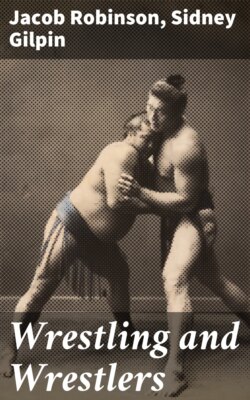Читать книгу Wrestling and Wrestlers - Sidney Gilpin - Страница 6
На сайте Литреса книга снята с продажи.
ANCIENT GRECIAN WRESTLING.
ОглавлениеTable of Contents
The ancient Grecians were passionately fond of festivals and games. In every particular State such institutions were occasionally celebrated for the amusement of the people; but these were far less interesting than the four public games frequented by multitudes from all the districts of Greece. The Pythian Games were celebrated at Delphi; the Isthmian at Corinth; the Nemæan at Nemæa in Argolis; and the Olympic at Olympia, near Elis. We propose to give a brief account of the Olympic games only, as being by far the most splendid, and in which victory was reputed to be the most honourable. The celebrity of these games was extended for many centuries after the extinction of Greek freedom, and their final abolition did not occur until after they had flourished for more than eleven hundred years.
The games were held in summer when the heat was excessive; and to add to the difficulty and fatigue experienced, the more violent exercises were performed in the afternoon, when even the spectators were scarcely able to remain exposed to the sun. To prevent the competition of such as were unskilful, the candidates were required to swear that for ten months before the commencement of the games they had made it their constant study to prepare for the contest; and during the last thirty days they were obliged to reside at Elis, and had to practise daily under the inspection of the judges. Hence, the permission to contend at Olympia was regarded as no inconsiderable honour, and served in some degree as a consolation to the vanquished.
Immediately before the commencement of the different exercises, a herald led every candidate separately through the assembly, and demanded if any one knew him to be a man of profligate character, or to have been guilty of any notorious crime. As numbers were present from every state in Greece—to some of whom each of the combatants was known—it rarely happened that any suspicious character chose to expose himself to such a scrutiny. The candidates were required to make a solemn declaration that they would not endeavour to gain the victory by bribing their adversaries, or by a violation of the laws regulating the different contests; and any person guilty of a breach of this promise was not merely deprived of the olive crown,[1] but was fined by the judges, and could never after contend at the games. These regulations seem to have accomplished the purpose for which they were intended, since, during several hundred years, only five instances occurred in which any improper artifice was known to be employed by the competitors in the games.
[1] Daiklès, the Messenian, was the first who had the honour of being crowned with the simple wreath woven from the sacred olive-tree near Olympia, for his victory in the Stadium.
The Greeks held the exercise of Wrestling in high estimation, which, in point of antiquity, stood next to the foot race. The object of the wrestler was to throw his adversary to the ground: but it was not till this had been thrice repeated, that he obtained the victory. Like all who contended in the games, the Wrestlers were accustomed to rub their bodies with oil, partly to check the excessive perspiration occasioned by the heat and the violence of the exercises, and partly from an opinion that the oil gave the limbs a greater degree of pliancy and agility. As the smoothness occasioned by the oil would have prevented the combatants from grasping each other with firmness, it was customary for them, after being anointed, to roll themselves in the dust of the Stadium, or to be sprinkled with a fine sand kept for that purpose at Olympia. If in falling, one of the Wrestlers dragged his adversary along with him, the combat was continued on the ground, till one of the parties had forced the other to yield the victory.
The inhabitants of Hindostan, and of the countries constituting the ancient kingdom of Assyria, have undergone a variety of revolutions; but inactivity has always formed the leading feature in their character. In every age they have fallen an easy prey to invaders; nor have the repeated instances of oppression to which they have been exposed, ever roused them to limit the exorbitant power of their sovereigns. The Greeks, living in a climate nearly as sultry as that of Asia, would probably have fallen victims to the same indolence, had not their early legislators perceived this danger, and employed the most judicious efforts to avert it. Among the means devised to accomplish this end, none seem to have been so effectual as the public games. It was not by any occasional effort that a victory could be gained at Olympia. Success could be obtained only by those who were inured to hardship; who had been accustomed to practise the athletic exercises while exposed to the scorching heat of the sun, and who had abstained from every pleasure which had a tendency to debilitate the constitution and lessen the power of exertion.[2]
[2] Hill's Essays.
